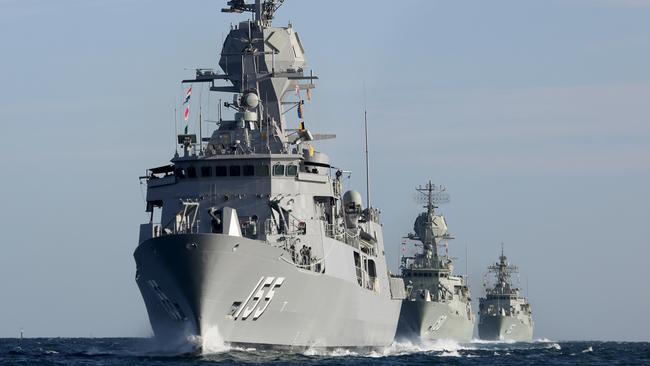Australian firms up in arms as Brits snare defence work
BAE Systems is facing a backlash after it excluded local firms from bidding to supply key equipment on the Future Frigates.

British defence giant BAE Systems is facing a backlash from Australian industry after the company excluded local firms from bidding to supply key equipment on the $35bn Future Frigates.
The company invited only its British suppliers to tender for major contracts on the first batch of three Hunter-class frigates, arguing Australian firms will be progressively integrated into the nine-ship program.
BAE Systems subsidiary ASC Shipbuilding said there were currently no Australian suppliers for many of the ship’s key systems, including its gas turbines, gearboxes, diesel generators and steering equipment, forcing it to look offshore. “In these specific cases we have made the decision with the commonwealth to appoint suppliers to the first batch of ships that, while not Australian, can first and foremost deliver the capability that is required, and can do so without putting at risk the schedule,” ASC Shipbuilding managing director Craig Lockhart said.
“If an Australian company is not involved in batch one, it does not mean they will not be involved in batch two or three.”
But the Australian Industry Defence Network, which represents 800 companies employing 40,000 people, said local firms could face difficulties breaking into the program after the first three ships were under way.
“AIDN is concerned to learn that BAE Systems and Defence have decided to appoint foreign suppliers into the Hunter program without allowing Australian companies the ability to compete in a fair and equitable manner,” chief executive Brent Clark said.
“To change established supply chains for future ship builds in itself introduces levels of risk that may impact on cost and schedule.
“If the intention truly is for Australian companies to be introduced at a later point in the process then it would appear to make more sense to bring them into the supply chain from the outset.”
Defence said the use of BAE’s UK supply chain for “major platform systems and subsystems” had been necessary to ensure steel was cut for the first ship by the end of 2022.
“The Hunter-class design will iterate between batches, with increasing opportunities for Australian major system providers,” a spokeswoman said.
BAE Systems is contractually obligated to ensure 54 per cent of its contracts go to Australian companies, but says it believes it can lift that to more than 60 per cent. The company said it had instructed original equipment suppliers to maximise Australian industry involvement in design, manufacturing, testing and installation.
The industry concerns come as BAE Systems faces serious design issues with the ship, which was sold to Australia as an 8800-tonne submarine hunter, but now looks like weighing more than 10,000 tonnes.
The Hunter-class frigate is based on Britain’s yet-to-be-built Type 26 ship, with the addition of the Australian-developed CEA phased array radar, the American Aegis combat system and an Australian-developed combat tactical interface by SAAB.
The weight blowout will require the ship to be longer and wider, and could potentially make it less stealthy.
The government is also bracing for months of coronavirus delays on up to $200bn worth of Defence programs, including the troubled $90bn Future Submarines.




To join the conversation, please log in. Don't have an account? Register
Join the conversation, you are commenting as Logout